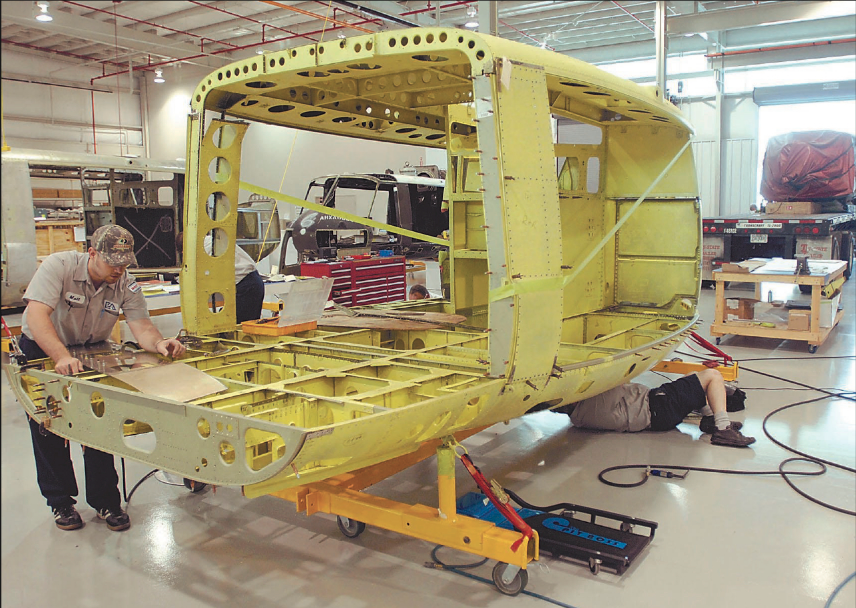
Originally published in the Bristol Herald Courier
Talk with some war veterans about helicopters, and they would likely say the Bell Model 205 was a crucial weapon for the United States in the Vietnam War.
They used the aircraft in many ways – search and rescue, transporting cargo, medical airlift and, of course, moving the troops.
Today, many of these once-prized helicopters lie rusting in fields or warehouses.
A handful of 205s, however, are being stripped, cleaned and rebuilt for civilian use. The work is taking place at Aeronautical Accessories.
The Piney Flats-based aeronautics company started a helicopter remanufacturing operation in February 2004. The first rebuilt helicopter was completed in December 2004, and it now flies in Dallas, Texas.
“This is one of the best projects I’ve been on because we’re not letting something just die,” said Charlie King, who oversees the upgrading of the 205s into 210 models.
In a 25,000-square-foot building in the Tri-County Industrial Park, his employees strip the helicopters down to the skeleton, or hull. The 19 workers then rebuild the engine, transmission, and make new rotary blades. The finished product is sold to health care facilities for medical airlift.
“This is going to end up being a third cheaper than selling new ones,” King said.
The project is just one example of how some Tri-Cities businesses are following a national trend. A number of businesses are remanufacturing or reclaiming old, used products for resale and making money in the process.
Although there’s always been a market for repaired and refinished goods, big companies like Xerox, General Electric and Caterpillar have made more money by slapping fresh parts on used products.
It’s caught on in Bristol, too.
On the Virginia side of town, Keystone Jewelers cleans old or discarded jewelry and turns the items over to new customers. And in Bristol, Tennessee, Whicker Glass employees refurbish house doors that feature glass. The company on Shelby Street replaces the glass, sands and repaints the frame and sells the doors.
These and other local businesses have increased revenue, added more employees and even opened larger facilities with the money earned through their remanufacturing efforts.
“The backbone of our company is definitely remanufacturing,” said Allen Hurley, president of Touchstone Wireless, based in Bristol, Tennessee.
Touchstone remakes broken cell phones. The business doesn’t pay high costs like most companies because the cell phones are furnished by the initial provider, rebuilt and improved and then sold back to the same company.
Business has been so good that Touchstone has moved from a cramped building on Blackey Road in September to its current 100,00-square-foot facility in the old Wal-Mart building on West State Street. The expansion also resulted in the creation of 400 jobs.
“Whereas our community has had companies close and leave, remanufacturing has made it easier for us to grow,” Hurley said.
Officials with U.S. companies that re-manfacture say it costs less to take back old products and refurbish them.
“It’s created another stream of revenue for American companies, but it also added another option for the customer,” Hurley said. “People have to watch their dollar a lot more than in the past, so this gives consumers another option other than new.”
Customers can choose between old and new at Bristol-area stores like Networking & Computers, a small shop that remanufactures computers.
The store opened in 1996 in Johnson City. In 2001, NAC opened another store in Greeneville and a third on Lee Highway in Bristol in 2003.
“But I wouldn’t be able to do that if I didn’t sell used computers,” said store owner Shawn Miller.
Miller gets used computers from store trade-ins or from customers who abandon them. For example, he has four computers that a customer dropped off a year ago for repairs but were never picked up. Miller has since wiped the hard drives clean.
“I’ll probably wait another week or so, just to make sure, but then I’ll put them out for sale,” Miller said.
Buying a remanufactured product is different from purchasing a used one because many larger companies take back their products and restore them to original or better quality.
Ultimately, it’s cheaper for the company because they’re not starting with expensive new parts, which benefits customers and their wallets.
“The cost-saving benefit is big for the consumer,” Hurley said. “And in today’s world, that’s hard to pass up.”